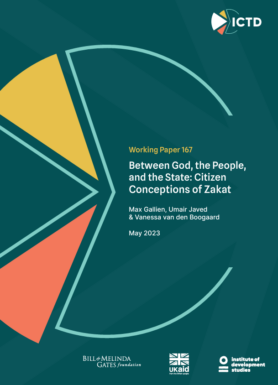Working Paper 167
The global pool for zakat – one of the five pillars of Islam mandating an annual payment typically equivalent to 2.5 per cent of an individual’s productive wealth – is estimated to make up between USD 200 billion and 1 trillion. States have long sought to harness zakat for their own budgets – and legitimacy. To date, however, there has been no systematic empirical discussion of how citizens perceive and engage with state involvement in zakat and how they perceive state-run zakat funds. These perceptions and experiences are central to important questions of how we conceptualise fiscal transfers and the relationship between citizens and states: if it is legally treated as one, does zakat function like a tax? Do citizens engage with it differently? Does its formalisation strengthen or undermine the social norms in which it is embedded?
This paper provides, to the best of our knowledge, the first comparative analysis of how citizens in Muslim-majority countries conceptualise zakat, attempting to situate it between religion, charity, and the state. We do so in the context of three lower middle-income countries (LMICs) – Morocco, Pakistan, and Egypt – representing variation in state involvement in zakat, relying on nationally representative surveys covering 5,484 respondents, of whom 2,648 reported that they had paid zakat in the preceding 12 months.
Despite heterogeneity in state practice across the three countries, and in contrast to our expectations, we find commonalities in how citizens perceive zakat. Across our cases, citizens understand zakat as existing beyond the state, even where the state is involved in zakat administration and enforcement. Rather than viewing it as a legal obligation akin to taxation or merely as a charitable payment, Muslims across diverse religious and institutional contexts predominately conceive of zakat as a form of informal tax, rooted in social pressures and sanctions in the afterlife, but existing beyond the limits of state authority. This has important conceptual implications for the study of public finance, which has been predominately state-centric, while suggesting that there are clear limits to states’ ability to harness zakat payments into public finance systems. It also suggests clear limits to the ability of states to ‘harness’ zakat as a fiscal tool through centralised administration or mandated enforcement.

